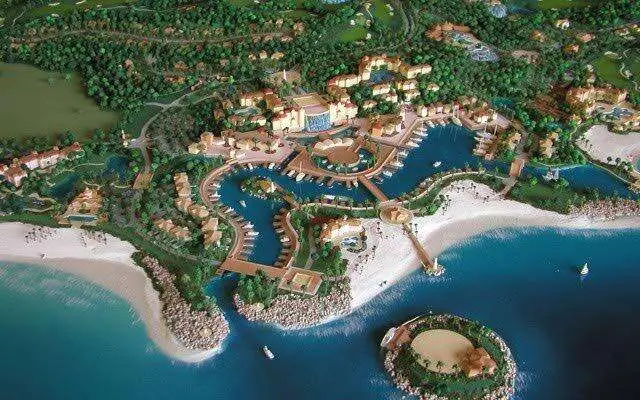
Harmonization, Government’s mega tourism project to tie down financing
THE Government of Jamaica is now seeking a project manager for Harmonization, a tourism development project in Trelawny. The project, aged over 20 years in conception, is managed by Harmonization Limited which is a unit at the Development Bank of Jamaica (DBJ), which itself was incorporated in April 2003 to execute a master plan for the 2,300-acre mega resort called Harmony Cove.
The tourism development will be on a 2,300-acre property on the Jamaican north coast, located 23 miles east of Montego Bay, St James, and 44 miles west of Ocho Rios, St Ann.
Harmonization was originally costed at US$7.5 billion by Harmonization Limited which is a partnership between the DBJ, the National Housing Trust (NHT) and originally Tavistock Jamaica Inc, a subsidiary of Tavistock Group — a global private investment company.
Jeffrey Hall, project chairman, said on Tuesday, November 22 that principals in the project remain the DBJ, the NHT and Tavistock. New sources of financing being worked on include a mix of debt, equity from the original founders and third-party equity. Financing is being concluded at this time.
Hall stated, “We hope to finalise a revised agreement for the first quarter of 2023. As to the cost of development, we are finalising the transaction now. The project manager will be a part of that.”
“The scope is an iconic resort development which includes a casino. The time frame is still being worked through. There is a detailed concept plan and there is an expectation that it will be developed over a three-year time frame.”
The development is slated to include a resort with world-class golf courses, luxury spa, marina facilities, commercial developments, luxury hotels, private residencies and other amenities. It will also include a hotel, casino, convention and entertainment centres, restaurants and retail assets.
Like Bernard Lodge in St Catherine, Harmony Cove in Trelawny is expected to create a major economic impact through direct and indirect job creation, tax revenue and a boost in foreign exchange inflows.
Originally, Harmonization as a joint venture agreement was based on a members’ agreement with Tavistock Group Inc which owned 51 per cent of Harmony Cove Limited. Harmonization owned 49 per cent.
Lands owned by Harmonization Limited were valued at US$45 million for the purpose of their transfer to Harmony Cove under the joint venture agreement with Tavistock, first dated September 28, 2006.
Subsequently, the joint venture agreement with Tavistock Group Inc was amended on February 3, 2009 to reflect contribution by Harmonization, through its subsidiary Silver Sands Estate Limited, of additional parcels of lands, according to the DBJ.
In consideration of the transfer of these additional lands, Harmonization was deemed to have subscribed for cumulative preference shares to be issued by Tavistock Group Inc in the amount of US$6,662,460.
Job creation
The Harmony Cove project is featured on the website of the Office of the Prime Minister, which touts it as a project that would “create a major economic surge on the north coast through direct and indirect job creation, tax revenue and a boost in foreign exchange inflows”.
In 2017, the DBJ disclosed having spent $1 billion on the project over time. A 2016 report indicated that the shareholders of Harmonization Limited —DBJ and the NHT— had entered into a new agreement between themselves to cease charging interest on their advances to the company, and issue preference shares to the existing shareholders in the ratio of their outstanding advances.
The auditor general previously reported that the NHT had invested $490,000 in Harmonization up to 2014, in addition to loans and accrued interest amounting to $1.59 billion.
Harmony Cove alongside Celebration Jamaica were the first two projects approved in Jamaica for the integrated resort development with casinos at their centre.
Subsequently however, applications for the operation of approved integrated resort developments were reopened in October 2021 as the Government shores up its strategies to attract casino gaming investment in Jamaica.
An integrated resort development consists of a mix of various tourism amenities and facilities in the same precinct, including but not limited to hotels, hotel rooms, villas, casinos, attractions, sporting facilities, entertainment facilities, service centres and shopping centres.
The designation enables the developer to then make an application to the Casino Gaming Commission for a licence to be issued under the Act to operate a casino within that resort development.
Originally, the Casino Gaming Act was passed by the Houses of Parliament in March 2010 and brought into force in June 2010 to facilitate Jamaica’s entry into and subsequent regulation of the casino gaming sector.
Amendments, which were made to the Casino Gaming Act, were meant, the government indicated, to enhance the regime and to strengthen its appeal to potential investors, and by doing so attract and increase foreign direct investment (FDI) into Jamaica.
























